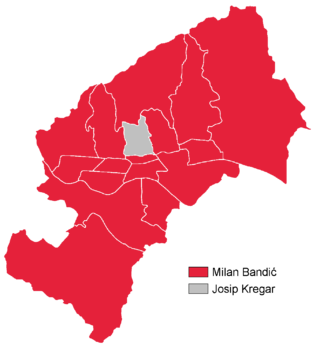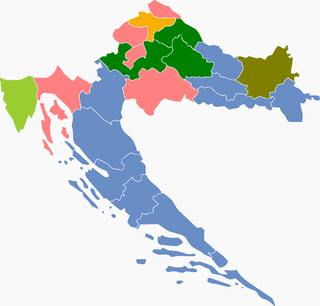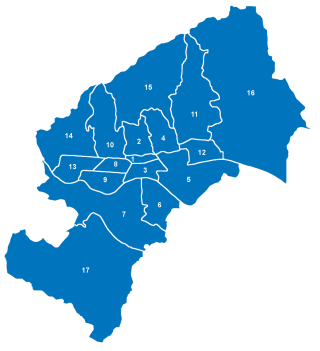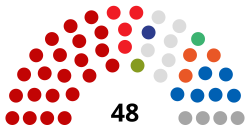
Zagreb is the capital and largest city of Croatia. It is in the north of the country, along the Sava river, at the southern slopes of the Medvednica mountain. Zagreb stands near the international border between Croatia and Slovenia at an elevation of approximately 158 m (518 ft) above sea level. At the 2021 census, the city itself had a population of 767,131, while the population of Zagreb metropolitan area is 1,217,150.
Regular elections in Croatia are mandated by the Constitution and legislation enacted by Parliament. The presidency, Parliament, county prefects and assemblies, city and town mayors, and city and municipal councils are all elective offices. Since 1990, seven presidential elections have been held. During the same period, ten parliamentary elections were also held. In addition, there were nine nationwide local elections. Croatia has also held three elections to elect members of the European Parliament following its accession to the EU on 1 July 2013.
Elections were held on 15 May 2005 in Zagreb, the capital of Croatia. Following the last local elections in 2001, Milan Bandić of the Social Democratic Party of Croatia (SDP) had been re-elected as the mayor of Zagreb. In 2002, an incident made him resign in favor of Deputy Mayor Vlasta Pavić, also from the SDP. Pavić remained formally in control of the city until 2005. In the 2005 elections, she was moved down the list of candidates to the 16th place, while the list holder and SDP's candidate for mayor was Bandić.

On 17 May 2009, local elections were held in Zagreb, the capital of Croatia. The incumbent mayor was Milan Bandić, a representative of the Social Democratic Party of Croatia (SDP), also the leading party in the previous city council. Bandić was reelected mayor in the second round of the elections with 61.84% of the votes.

Local elections were held in Croatia on 17 May 2009, with the second round held on 31 May where necessary.

The Old City Hall is a complex of three adjacent buildings located in the Gradec neighbourhood in Zagreb, Croatia. The three buildings were joined in the late 19th century and since then, the complex has served as the place where all sessions of the city assembly are held.

Davor Bernardić is a Croatian physicist and politician who served as the president of the Social Democratic Party from 2016 to 2020. He also served as one of four SDP vice-presidents, leader of the SDP's Zagreb branch, and president of the SDP Youth Forum. Bernardić has been elected to the Croatian Parliament five times, representing the 1st electoral district.

Green alternative - Sustainable Development of Croatia or ORaH is a minor green political party in Croatia.
Elections were held in Zagreb on 13 April 1997 for members of the Zagreb Assembly. The Croatian Democratic Union (HDZ) won a majority in the City Assembly with 24 seats out of 50. Marina Matulović-Dropulić was named the new Mayor of Zagreb.
New Left was a social-democratic and democratic socialist political party in Croatia. It also promotes anti-fascism, environmentalism, and progressivism on social issues.

Zagreb is split into seventeen administrative divisions called city districts. The city district, along with a local committee, is a form of local self-government in the City of Zagreb through which citizens participate in the decision-making process in self-governing areas of the City and local affairs that directly affect their lives. The city district is established for an area that represents urban, economic and social entity, which is linked to the common interests of citizens. The current division was established by the Statute of the City of Zagreb on 14 December 1999. Legally, a city district is a legal person who has its own governing bodies.
Elections were held in Zagreb on 21 May 2001 for members of the Zagreb Assembly. Milan Bandić, the incumbent mayor since 2000, led the list of the Social Democratic Party of Croatia (SDP), the largest centre-left party in the country and at the time a member of the governing coalition of Croatia.

The Green–Left Coalition was a left-wing electoral alliance in Croatia represented by six MPs. It is presently composed of the We Can! – Political Platform and New Left, as well some localist political parties and platforms, such as Zagreb is OURS! and For the City movements from City of Zagreb and Srđ is the City! from Dubrovnik. It promotes democratic socialism, green politics, and progressivism on social issues.

Zagreb is OURS! is a municipalist green left political party from Zagreb, Croatia. After winning first seats in 2017 elections for the Zagreb Assembly and profiling itself as the most vocal opposition to the mayor Milan Bandić and his local majority coalition, the platform took part in the 2019 EU elections, as well as the 2020 Croatian parliamentary election within green-left platform We can!.

We Can! – Political Platform is a left-wing, green political party in Croatia formed by local green and leftist movements and initiatives in order to act on the national level for European Parliament and parliament elections. After the 2021 local elections in Zagreb, they became the largest political party in the Zagreb Assembly, winning 23 seats in total. Their mayoral candidate Tomislav Tomašević won a landslide victory on 31 May 2021.

Tomislav Tomašević is a Croatian politician, activist, environmentalist and political scientist who is serving as mayor of Zagreb since 2021. He is one of the leaders of the local Zagreb is OURS! political party and the national We Can! political party. Since the 2017 Zagreb local elections, he has been a delegate in the Zagreb Assembly. He was also elected to the Croatian Parliament in the 2020 election. He serves as the de facto leader of the Green–Left Coalition.
Momir Stojilković is a politician in Serbia. He has served in the local government of Vranje and has been a member of the National Assembly of Serbia since 2020, serving with the Strength of Serbia Movement.

Jelena Pavičić Vukičević is a Croatian politician who served as president of the Bandić Milan 365 - Labour and Solidarity Party. She assumed the position following the death of the previous party president, Milan Bandić, on 28 February 2021. Pavičić Vukičević also assumed Bandić's role of the mayor of Zagreb, which she served until the 4 June 2021, following her loss at the 2021 Zagreb mayoral elections.

Elections were held in Zagreb on 16 May 2021 for the 53rd mayor of Zagreb, the two deputy mayors, the 47 members of the Zagreb Assembly, the councils of districts and the local committees, as part of the 2021 Croatian local elections. The runoff for the mayor took place on 30 May 2021.
Local elections were held in cities and municipalities across Serbia on 20 December 1992, with a second round of voting taking place on 3 January 1993. The local elections were held concurrently with parliamentary elections in Yugoslavia, presidential and parliamentary elections in Serbia, and elections for the Vojvodina provincial assembly.
















